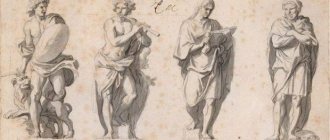Since ancient times, a connection between temperament and physiology has been observed. The father of medicine, Hippocrates, who lived in the 5th century BC, identified four types of temperament. In his opinion, they were determined by one or another liquid prevailing in the human body. For sanguine people it is blood, for choleric people it is bile, for phlegmatic people it is mucus, and for melancholic people it is black bile. That is, temperaments were viewed as exclusively physiological phenomena. What changes in their understanding have occurred since then? - This is what we will talk about. ...
What is temperament
Temperament - in psychology, is an individual characteristic of a person, which largely depends on his innate, psychophysiological qualities. Temperament is a strictly individual trait based on mental activity, speed and intensity of psychophysiological processes.
This is interesting: ambitious and ambition - what do these terms mean?
There are three areas in which temperament manifests itself:
- The degree of human activity in a general sense.
- Differences in the area of movement.
- The degree of external expression of feelings.
General activity is characterized by the intensity with which a person interacts with the surrounding natural or social environment. There are two extremes here: some people are too sluggish and passive, while others are very fast and active.
Motor activity (motility) is expressed in how fast and sharp movements and speech are or, conversely, how slow they are and the person is silent.
Expression of feelings, or emotionality , is manifested in how quickly the emotional state changes, susceptibility to external influences, to the feelings of another person.
This is interesting: what stages does a personality go through in the process of formation?
Briefly about the concept
First, some general information. Before talking about mixed and highly emotional types of temperament, it is necessary to explain what it depends on and how it is formed.
Well, a person has these characteristics from birth. They are of psychophysiological origin and therefore very stable. It is temperament that determines the dynamic characteristics of a person’s states and ongoing mental processes.
At the same time, this characteristic does not affect moral qualities and cognitive abilities in any way. However, temperament must be taken into account when choosing a field of activity. Thus, people with slow reactions will find it difficult to control some mechanisms at high speeds. But they will cope excellently with work that requires perseverance and concentration.
Types of temperament
At the beginning of the 18th century, the types of temperament described by Hippocrates were compared with four psychotypes, which served as the beginning of the psychological direction in the study of temperaments. Today, the simple ideas of ancient people are practically no different from those in the 18th century.
- The choleric type is defined as irritable.
- The sanguine type is associated with cheerfulness.
- The phlegmatic type is defined as calm.
- The melancholic type is associated with sadness and excessive impressionability.
In modern psychology, temperament is described as stable and established natural personality qualities that determine the speed of mental activity, regardless of its internal content.
This is interesting: what is degradation?
Techniques
- Rusalova allows you to separate the properties of individuality. Represents one hundred and fifty questions. The subject is presented with standard situations in which it is necessary to give the answer that first comes to mind.
- Belov - the individual is presented with cards on which twenty properties are indicated that characterize each type of temperament. A person chooses those that he has.
- Smirnova helps determine the presence of introversion or extraversion, excitability and balance, fast or slow reaction rate, high or low activity.
- The technique developed by Eysenck – testing represented by questions – achieved the greatest popularity. The subject is asked one hundred questions characterizing human behavior. If the individual agrees with the statement, he puts a “+” sign; if not, then “-”. It is important that the answers are quick and honest. Such a questionnaire allows you to identify the level of psychoticism, extraversion, introversion, and neuroticism.
- Obozov allows you to find out the typology of temperament, even in the absence of the subject. Fifteen character traits are given, and the person chooses the level of manifestation of each of them. For example, there is a scale of balanced behavior, where you need to choose what is more suitable for a particular person. It can be either “excellently balanced” or “well balanced.” Depending on what level of manifestation was chosen, a certain number of points is given. At the end, points are tallied. The type that scores the most points is determined as priority.
You need to understand that you cannot find out exactly what kind of temperament a person has. Some personality traits may wax or wane throughout life.
Now you know how to determine your temperament type. Choose the method that suits you or try different options. Remember that knowing a person’s temperament makes communicating with him much easier. We must not forget that an individual can begin to adjust his behavior when he recognizes his strengths, as well as weaknesses, and become better.
Extroverts and introverts
The qualities of temperament include introversion and extraversion, the pace of reactions, rigidity (inflexibility) and plasticity.
Extraversion and introversion are qualities of temperament that were introduced as concepts by Swiss psychiatrist Carl Gustav Jung.
- An extrovert focuses on his own manifestation in the world around him, that is, on external impressions that arose in a given period of time. These include choleric and sanguine.
- An introvert - on his inner world, psychological state, that is, the internal reality is more important for him than the external one. These are phlegmatic and melancholic.
Recommendations
The choleric person and those who communicate with him can be given some advice:
5 useful tips for choleric people
- Learn to adequately express your emotions. Instead of yelling at your subordinate, say: I’m angry because the report wasn’t submitted on time. After this, left alone, you can tear a sheet of paper into small pieces or scribble on paper with a pen until the emotional fervor cools down.
- Try not to make hasty conclusions. In order not to regret the decisions you make later, you should force yourself to sit down and think everything through.
- Learn to hear other people and feel when they become uncomfortable in communication.
- More often turn not to emotions, but to reason. It would be nice to learn to think first and then do, and not vice versa.
- Learn to protect your nervous system from overload so that stress does not have serious consequences on your health.
How to communicate correctly with a choleric person
When communicating with a choleric person, the main thing is not to take to heart everything that he says in an emotional outburst. Most likely, he will quickly leave and come to apologize himself, as he will understand that he has said a lot of unnecessary things. You should not try to put pressure on his pain points, as this will lead to an explosion of feelings. In communication, it is good to use active listening methods so that he feels that he is understood and heard, then the conversation will be more productive.
Sofia Emelyanova
Author of the article. Psychologist.
About the expert
Reaction speed, rigidity, plasticity
The speed of reactions is a characteristic of the pace at which mental processes and the body’s response occur. These include quickness of mind, speech and gestures. The speed of reactions is high in people who are sanguine and choleric, as well as in melancholic people - if they are well rested. In melancholic people who are tired and phlegmatic people it is lowered.
Sometimes this causes problems in communication between people with different temperaments. People with quick reactions do not always notice that people who are more inhibited do not have the opportunity to follow the course of their thoughts. Because of this, they come to unfounded conclusions that the latter have low mental abilities. This can especially interfere with business relationships.
Rigidity and plasticity . The first quality indicates that a person has difficulty adapting to external influences, while the second, on the contrary, indicates good adaptation. Sanguine people have the highest plasticity. Rigidity is characteristic of melancholic, phlegmatic and choleric people.
Who is who?
A brief description of each temperament, based on the nervous activity of its owner:
Sanguine - strong, balanced, agile;
Choleric - strong, unbalanced, mobile;
Phlegmatic - strong, balanced, inert;
Melancholic - weak, unbalanced, inactive.
A person’s belonging to one of the four temperaments can be determined situationally - by his reaction to an obstacle that arises in his path: a choleric person sweeps him away; the sanguine person bypasses; a phlegmatic person often doesn’t even notice; the melancholic person stops before an obstacle.
Inactivity and activity
Inactivity is an indicator of an involuntary reaction to stimuli, both external and internal. It represents a defensive reaction to criticism, insult, or raised tone. Inactivity is characteristic of phlegmatic and melancholic people and rare for choleric and sanguine people.
Activity is the opposite of inactivity; it is a characteristic of a person’s ability to overcome obstacles and achieve goals.
Its expressions are:
- focus;
- persistence;
- high concentration of attention.
A phlegmatic person is highly active, but since he has low reactivity, his inclusion in work occurs slowly. A phlegmatic person does not overwork. Choleric exhibits high activity in combination with reactivity. Sanguine people are also quite active, but they may lose interest in monotonous activities. Melancholic people are characterized by low activity.
His activity largely depends on how activity and reactivity are correlated in a person. From random circumstances, external or internal (mood, unplanned, insignificant events) or from goal setting, strong desires, conviction of something.
Types of temperament and their differences
Are common
Choleric . Hyperactive, hot-tempered, hasty, sociable, leader.
Sanguine . Active, cheerful, superficial, sociable, joker.
Phlegmatic . Calm, slow, thoughtful, closed, obsessive.
Melancholic . Vulnerable, creative, prone to empathy, emotional.
Body type
Choleric . Tall, thin build, long narrow flat chest. The forehead is wider than the lower part of the face, the chin is pointed. The nose is pointed, with a hump and a downward tip. Long neck, well defined cheekbones.
Sanguine . Round smooth shape, medium or low height, short wide bones. Wide short chest, round head and forehead, weakly defined cheekbones, short thick legs, neck.
Phlegmatic . Wide bones, massive build, short thick neck, wide short chest with a rounded shape. Large straight nose with a downturned tip. The chin is the same as the forehead, or wider.
Melancholic . Pointed features, fragile physique, thin bones, weak muscles, flat chest, long thin neck, high square forehead, the upper part of the face is noticeably wider than the lower.
Health
Choleric . The weak point is the digestive system (liver, gall bladder). Pulse - 75-85 beats per minute.
Sanguine . The weak point is the cardiovascular system. Pulse - 65-75 beats per minute.
Phlegmatic . The weak point is the digestive system (stomach, intestines). Pulse - less than 65 beats per minute.
Melancholic . The weak point is the nervous system. Pulse - more than 85 beats per minute.
Relationship
Choleric . He quickly gets along with people, often and quickly becomes emotionally attached, and is difficult to part with.
Sanguine . He quickly gets along with people, rarely gets attached, and easily replaces one person with another.
Phlegmatic . He gets along with people for a long time, rarely gets attached for a long time, and has a hard time letting people go from his life.
Melancholic . He gets along with people for a long time, often but slowly becomes attached, and is difficult to part with.
Career and performance
Choleric . Active, ambitious, persistent, creative. The boss, the leader, loves to lead. The priority is career growth.
Sanguine . Active, ambitious, superficial, excellent organizer. Leader, loves recognition. The priority is money.
Phlegmatic . Inert, slow, serious, reliable, driven. Likes to analyze and systematize. The priority is stability.
Melancholic . Inert, gets tired quickly, driven. Dreamer, thinker, creative person. The priority is a friendly, warm atmosphere.
Reaction to stress
Choleric . Angry, irritated, expresses emotions vividly. Calms down quickly. Goes to solve the problem.
Sanguine . Ignores the problem or finds advantages in it. Finds someone who can solve the problem or switches to another task.
Phlegmatic . Thinks about the causes of the problem. He thinks about the solution plan for a long time, then begins to systematically implement it.
Melancholic . He is lost, very worried, looking for support and help. If he doesn’t find it, he often gives up and worries about it for a long time.
Self-realization
Choleric . Demands popularity, because he loves when people depend on him. Goes ahead, takes risks and sacrifices.
Sanguine . He demands recognition because he loves to be admired. Obstacles are usually avoided.
Phlegmatic . Seeks to maintain the current state of affairs. Removes obstacles only if they interfere with his measured life, but does it effectively.
Melancholic . Needs recognition and emotional support to increase self-esteem. Often stops efforts because he is afraid that he will not cope.
Interests and hobbies
Choleric . Sports, extreme sports, travel, competitions, communication, quest games, excitement and risk.
Sanguine . Acting, humor, community service, communication, gossip, travel.
Phlegmatic . Puzzles, reading, crafts, cinema, science, nature, mechanics, architecture.
Melancholic . Art, puzzles, mysticism and esotericism, philosophy, meditation, handicrafts.
Knowing how different temperament types react to the world and life situations can be really helpful. Understanding yourself and others makes it easier and faster to achieve internal (personality) and external (relationship) harmony.
Emotional excitability
It is a reflection of the line of minimal impact beyond which an emotional reaction occurs, as well as the speed of its development.
Sanguine people, melancholic people and choleric people are characterized by increased excitability. In phlegmatic people it is reduced. The characteristics of temperament inherent in an individual are determined by the unique combination of activity and the severity of emotional reactions to varying degrees. Activity is determined by how intensely a person interacts with the environment.
Today, the scientific community remains confident that the considered properties of human behavior are based on physiology. That is, they are determined by certain features in the functioning of physiological structures. But what kind of structures these are is not yet clear. However, what is indisputable is that temperament is an innate property that serves as the basis for most personality traits, which include character. And the sensual basis of character is temperament.
The influence of temperament on human life
Each person has his own personality. The path of life for everyone is determined by the life circumstances passed through, their perceptions and beliefs of the person. In any case, it is the years lived that correct the worldview and shape the behavior of a person with his character.
Sanguine people make excellent leaders. They have good prudence and know perfectly well how to win people over. This type of personality is suitable for work in the fields of pedagogy, journalism, medicine, and the like... These individuals avoid monotony in work, which is why the field of activity as an archivist, restorer, or accountant is unlikely to suit them.
Cholerics, in turn, are distinguished by their leadership qualities, which makes them good and fair bosses. This type of people quickly adapts to changes and can easily change their environment. Cholerics are characterized by a work environment with reduced energy consumption: designers, journalists, politicians, miners, speakers, TV reporter, radio presenter, artist, manager, entrepreneur. It is practically impossible to force this type of personality to work monotonously with papers.
Phlegmatic people, during a stressful situation, in any area of life, can always cope with it perfectly and take the ideal action. Phlegmatic people have a strong side associated with the exact sciences. A phlegmatic person can become a brilliant mathematician, IT specialist, astronomer, microbiologist, biophysicist, cultural scientist or botanist.
Melancholic people are good workers, they can cope with any life task. They are very successful in activities that require attention to detail and observation. Melancholic people prefer to work alone from other people. A melancholic person can be an excellent film critic, writer, radio mechanic, fashion designer, turner, agronomist, mechanic, or veterinarian. Their work should not contain stress, since their nervous system is very shaky, a profession such as a doctor, rescue service, or military will be unbearable.
Attention! Paying attention to the characteristics of each of the temperaments, in no case should one single out that some of them are good and some are bad. Each personality type has its own advantages and disadvantages.
Phlegmatic and melancholic
A phlegmatic person is a person who is unhurried, indifferent to many things, has a stable sense of purpose and mood, and outwardly shows his emotions with extreme restraint. In his work, he shows persistence and firmness while remaining calm and diligent.
A melancholic person is a personality type characterized by a vulnerable psyche; he experiences different events all the time. It is difficult for a person with such a temperament to keep his experiences inside; he is very impressionable and does not have sufficient willpower to cope with feelings.
Note to the manager
Knowing the essence of the matter at least in general terms, a sanguine person can brilliantly conduct a conversation with anyone. As you know, sanguine people are good speakers. Therefore, they should be given the floor more often at various meetings and conferences. However, technical issues in work often cause difficulties for sanguine people. You shouldn’t trust them with monotonous, conveyor-type work that requires constant attention.
Phlegmatic colleague
The phlegmatic person is unhurried and thorough, possesses enviable equanimity and composure. This is a peace-loving and restrained person who is difficult to anger. He does not like innovation and is generally quite conservative.
A phlegmatic person is not inclined to be a leader: he can work both in a team and independently. He has smooth and friendly relationships with colleagues and easily adapts to the mood and atmosphere of the team. It is calm and pleasant to communicate with phlegmatic people, because it is known in advance that the interlocutor will not flare up without a good reason, and will not start shouting if he does not like something in the statements. The dialogue will always be constructive, objections will be logical and reasoned.
Communicating with phlegmatic people can be difficult because it is difficult to recognize their emotional reaction to everything that others do and say. One can only guess how this person perceived something, and whether he was offended. Also, phlegmatic people can easily gain fame as bores - they like to tell something in detail and in too much detail, so sometimes it becomes boring in their company.
Advice to colleagues: To achieve his respect, you need to share his values - work conscientiously, not commit rash actions, and especially not force him to participate in them! A phlegmatic person will like it if you come to him for advice, and then listen with interest and without objections.
Choleric and sanguine
A choleric person is a sharp, fast and impetuous type, while he is extremely unbalanced, with lightning-fast changes in mood and emotional outbursts. A choleric person does not have balance in his nervous processes, which distinguishes him from a sanguine person. People with this temperament recklessly waste their emotional strength and become exhausted.
A sanguine person is a lively, bright, very active person, with a high frequency of changes in mood and impressionability, with a high-speed reaction to any events occurring in the world around him. A sanguine person very easily comes to terms with any failures and problems. As a rule, he is distinguished by lively facial expressions and is successful in his activities. This happens when he is interested in a process that makes him very excited. If the work is not of particular interest to him, then the sanguine person becomes indifferent and begins to get bored.
Each type of temperament includes both positive and negative traits. A person can be protected from the excessive manifestation of negative properties inherent in nature by his upbringing and kind attitude towards other people.
How to determine the type of temperament?
It is very useful to learn to calculate not only your own type (or types), but also the characteristics of those around you. Knowing your mental complex and its characteristics provides the following advantages :
- easier search for a suitable profession or hobby;
- establishing internal balance with your “I”;
- understanding your own strengths and weaknesses;
- awareness of the reasons why certain traits are very difficult to change;
- the ability to predict one’s behavior in unfamiliar situations;
- at the end of the day, it's just interesting and educational.
As for determining alien types, the advantages are as follows:
- understanding others and the ability to find an approach to people of different temperaments;
- improved relationships with relatives, friends, spouses and increased chances of a promising romantic acquaintance;
- the opportunity to realize your career by finding a common language with colleagues, superiors and clients;
- a more noticeable and successful influence on others (speaking and communication in general);
- predicting the standard behavior pattern of new acquaintances;
- a chance to get rid of addiction in relationships, victim status;
- a better understanding of how to raise your children.
The situation is reminiscent of a poker game. A person ignorant of his temperament does not understand the value of even his own cards. But those who study this topic will clearly see the entire layout of the game and easily calculate the opponent’s card combination.
To find out your type, just take a temperament test. If you need to understand another person, just watch him. Some properties will be clear immediately (how actively he gestures, for example), others will take more time.
Temperament of a sanguine person according to Pavlov
Physiologist Pavlov, in his description of the distinctive features of a sanguine person’s temperament, says that he is a productive worker, an enthusiast, but only when he has a lot of interesting things to do that cause constant excitement. In the absence of such things, he is lethargic and boring. A sanguine person easily adapts to changing life situations. He has a sociable character that allows him to communicate well with a large number of people. His feelings arise with ease and speed, replacing each other.
His stereotypes are not established, and conditioned reflexes are developed at high speed. In an unfamiliar environment, he does not feel constrained and can quickly switch attention and change types of activities. A sanguine person is stable in his feelings. People with this temperament are especially suitable for activities that require great effort, high speed of reactions, and distribution of attention between several objects.
Note to the manager
A phlegmatic person works well in conditions of monotony and monotony, where endurance, patience and perseverance are needed. Usually he switches slowly from one job to another, so if he has already taken on one task, he will see it through to the end. He needs to give instructions accurately and concisely, preferably in writing, so that he can think about and analyze the new information. Under no circumstances should you entrust a person of this type of temperament with a job that requires initiative or prolonged communication with people! Working with clients is simply contraindicated for them.
Choleric colleague
A choleric person is a very impulsive and lively person who reacts emotionally to everything that happens. He is passionate about his work, can overcome significant difficulties and never gives up. If something fails to be done the first time, the choleric person will solve the problem again and again until he brings the matter to a victorious conclusion. He must always win - this is his main rule.
Choleric loves various changes, and, oddly enough, both positive and not so positive. The increased emotionality of choleric people leads to the fact that all their thoughts are literally “written on their faces” - you can easily determine when a choleric person is interested, when he is bored or irritated.
By nature, choleric people are sociable and easily make contact.
They like to subjugate and control those around them; they see everyone as rivals. Excessive straightforwardness, hot temper, harshness and intolerance sometimes make it difficult for a choleric person to stay in a team: he cannot always stop in time, which offends others, without meaning to. The choleric person actively gets down to work, plans a lot, but quickly burns out and becomes not only useless, but also negatively inclined towards the task, which can cause bewilderment and dissatisfaction among colleagues. Advice to colleagues: If you work with a choleric person, do not react to his outbursts and do not try to shout down, do not argue. Put an interested smile on your face, speak in a friendly tone, you can even make an inoffensive joke. Show confidence. This will puzzle the choleric and at the same time calm him down.
Temperament of a choleric person
According to Pavlov, a choleric person is a combative person , on the rise, he is prone to rapid irritability.
When he gets carried away with something, he uses his strength to the maximum and ends up feeling very exhausted or even exhausted. Choleric people are characterized by high emotional reactivity and motor sharpness. In an unfavorable situation, the increased level of excitability characteristic of people of choleric temperament can play a cruel joke on them. They can flare up over a trifle, becoming aggressive.
When a choleric person has the necessary motivation, he can overcome great difficulties by passionately devoting himself to his work. His mood changes dramatically. A choleric person achieves the greatest results in a situation in which high reactivity and immediate tension are required.
Two of a Kind?
The interaction of colleagues and their labor relations directly depend on their temperaments.
Choleric-phlegmatic
The perfect couple. Each of them has qualities that the other does not have, they complement each other and this is why they like each other. The phlegmatic person patiently endures the emotional outbursts of the choleric person, who likes him for his thoroughness, reliability and responsibility. The choleric person in phlegmatic finds a quiet haven, stability and peace, at the same time does not allow him to get stuck in passivity, constantly spurs him on and activates him, periodically even tries to control him.
Sanguine-choleric
A very active, life-oriented union. They have something to talk about, something to help each other with. At the same time, mutual assistance, although not complete, is very significant: for a choleric person - on the organizational side, for a sanguine person - in putting plans into practice. The choleric person thinks, the sanguine person carries out. However, sometimes an exchange of opinions can develop into arguments and quarrels, insistence on one’s point of view and rivalry. To maintain balance, it is necessary to adapt to each other, and this should be done by both parties and equally.
Melancholic-sanguine
A promising alliance with mutual respect and tact. Mutual assistance can be very effective: on the part of a melancholic person - on a spiritual, internal level, and on the part of a sanguine person - on a social level. A melancholic person feels best with a sanguine person: the irrational switches of the first not only do not irritate him, but, on the contrary, provide him with new interesting impressions and distract him from sad thoughts. A sanguine person gets along well with a melancholic person due to his balance and sociability.
Melancholic-phlegmatic
The relationship in this couple is relatively calm. They pay little attention to each other, since both are immersed in their inner world. A melancholic person may not like the apparent slowness and passivity of a phlegmatic person, and a phlegmatic person may not like the increased anxiety and excessive restlessness of a melancholic person. However, there is no tangible discomfort in the relationship. They are also not particularly interested in rivalry and disputes. In such a union, there will inevitably be sympathy and respect for the inner world of the other person, but at the same time, alienation will increase due to a lack of initiative.
Sanguine-phlegmatic
Quite an interesting form of union. There is little mutual understanding, but mutual assistance is significant and active. Especially when there are common interests and practical issues in the business sphere. Good cooperation is ensured by the social activity of a sanguine person and the hard work of a phlegmatic person. However, a sanguine person cannot be denied practicality and thoroughness. Conflicts in such a couple are insignificant, since both feel a practical need for each other, which they value much higher than defending their opinion. Usually in this pair the sanguine person is the leader, and the phlegmatic person, having easily ceded his authority, turns out to be a follower.
Melancholic-choleric
The cooperation of these two types is highly undesirable, because the domineering choleric person will quickly and peremptorily “enslave” the timid and quiet melancholic person. The straightforwardness often unconscious to a choleric person, despite all his caution, will hurt a very sensitive melancholic person. As a result, tension, discomfort, and mutual accusations will arise between them. They have mutual understanding, but within narrow limits. There is little mutual assistance in this couple, although it can be significant: in some situations, the choleric person can look after or take the melancholic person under his protection.
Temperament squared
If people have the same type of temperament, then the most favorable combination will be two phlegmatic or melancholic people, somewhat worse - two sanguine people, and very bad - two choleric people.
This situation is easily explained: phlegmatic people are the most balanced people, they are difficult to anger. Melancholic people are impressionable, very vulnerable and touchy, but they are quite compliant and prone to compromise in order to achieve peace of mind. Sanguine people are independent and emotional, but easy-going. Noticing that the brewing conflict could take a serious turn, they easily compromise to restore balance in their relations with each other. It is most difficult for two straightforward, excitable and uncontrollable choleric people to maintain balance in a relationship.
| Combination | Favorable | Working | Poorly compatible |
| sanguine | melancholic | sanguine, choleric | phlegmatic person |
| choleric | phlegmatic person | sanguine | choleric, melancholic |
| phlegmatic person | choleric | melancholic, phlegmatic, sanguine | works well with everyone |
| melancholic | sanguine | phlegmatic, melancholic | choleric |
Phlegmatic temperament
A phlegmatic person always behaves evenly, calmly, he is a hard worker, persistent and persistent. This is how I.P. Pavlov described him . The reactions of a phlegmatic person are characterized by slowness and stability of mood. He expresses his feelings little, and in difficult situations he is calm and self-possessed. There are no impulsive and impetuous movements, since in his nervous system excitation is balanced by inhibition.
A phlegmatic person has the ability to correctly calculate forces, is persistent and gets things done to the end. It is not easy for him to switch attention and switch to another type of activity. He has stable stereotypes, and his behavior is not flexible. A person with a phlegmatic temperament can be successful in those areas of activity in which it is necessary to distribute forces evenly, have perseverance, great patience, and the ability to concentrate.
Note to the manager
Entrusting a choleric person with systematic, scrupulous work means immediately dooming the business to complete failure. He is attracted to creative work in which he needs to make non-standard decisions. Showing initiative is a mandatory factor in the existence of a choleric person. Therefore, it is better to entrust him with a task in which he is a master: going somewhere, negotiating with someone, resolving issues over the phone. Only he needs to be given clear, concise instructions.
Melancholic colleague
This is a sensitive, touchy and vulnerable person. Easily gets upset even with minor failures. He is usually self-absorbed and has a hard time dealing with conflicts. The slightest stress can greatly damage his performance.
Melancholic people are not interested in other people; they are more concerned about their own inner world. In a group they are unsociable, keep aloof, and are socially passive. In communication they easily obey the leader and do not compete with anyone. They love to be looked after and prefer to remain in the shadows.
The melancholic person’s social circle is narrow, but his relationships with people are strong and deep.
A melancholic person is a wonderful and reliable comrade, he will never leave you in trouble, he knows how to very subtly feel a person’s mood, you can always find sympathy from him. He quickly gets tired of communicating with unfamiliar people, but he calmly endures loneliness. As a rule, a melancholic person avoids tension in relationships with colleagues by all means and is absolutely conflict-free. Advice to colleagues: When communicating with him, you must be sensitive: always speak calmly and softly, avoiding raised voices and harsh expressions, and praise as often as possible.
Melancholic temperament
According to Pavlov, the melancholic temperament is a type of nervous system that is inhibitory. A melancholic person does not trust anyone, does not have any hopes, sees the bad and dangerous in everything. He is distinguished by increased vulnerability and a tendency to experience strong emotions, sometimes out of nowhere. His feelings quickly manifest themselves, he cannot restrain them, so they are always noticeable to others. The activities of a melancholic person are often hampered by strong external influences.
He is a pronounced introvert, closed in on his own experiences, avoids contact with strangers and changes in environment. He is prone to indecision, shyness, is timid, and sometimes cowardly. If a melancholic person is in a familiar , favorable environment, then he is able to achieve good results in activities that require high sensitivity, observation, reactivity, and good learning ability.
In conclusion, it should be noted that there are no people who have one or another temperament in its pure form. But the general trend, as a rule, is visible. According to researchers, a person's character can change throughout life, but temperament never does. Melancholic, sanguine, choleric, you can find out by following the link.
Phlegmatic - his personality characteristics
- A phlegmatic person has a very strong and inert nervous system (it is difficult to unbalance him). Such people are able to engage in monotonous activities for a long time without getting tired at all. Such a person gets stuck on something and it is quite difficult for him to switch.
- The nervous system of a phlegmatic person is quite slow, so from the outside he may look slightly inhibited both in actions and in perception. For example, such people gesture little, move slowly, and are not particularly dexterous or fast. They seem to be slow to get anything. It is especially difficult for phlegmatic people to react quickly when something is conveyed on an emotional level.
- A phlegmatic person is a pronounced introvert (for him, internal representation is more important than external stimuli). Although, unlike a melancholic person, for whom his emotional processes are more important, for a phlegmatic person his thoughts are more important.
- Due to the predominance of inhibition processes in mental activity, it is very easy for such people to stop their internal impulses and restrain their emotions (they have a strong “ego”). But they tend to accumulate affect. That is, the phlegmatic person will restrain himself the first time, the second time too, but the third time he can throw out all his accumulated aggression at once and no one will find it enough.
- Phlegmatic people are quite socially adapted. Problems can arise only in understanding the feelings (and subtexts) of other people, and your own feelings too. However, in real life it doesn't look so scary.
- Also, phlegmatic people quite easily and naturally support social attitudes, although they reach them more slowly (they may follow a slightly outdated fashion).
- Due to the predominance of inhibition in the emotional sphere, such people are very rational and make decisions only on the basis of logic (without any impulsiveness).
- Individual and monotonous work is well suited for phlegmatic people. They make excellent programmers, financiers, scientists, engineers, and the like. In general, people with this temperament are excellent hard workers.
- There are many phlegmatic people in science, although if we talk about true genius, then this is more likely to be melancholic. Such people have low learning ability, that is, they take a long time to grasp certain skills, but if they have already learned something, they will never forget it.
- The phlegmatic also gets along with people rather slowly, and at the same time, the relationship still remains rather superficial due to the lack of emotional overtones.
- But nevertheless, such people are still capable of long-term relationships due to the fact that it is simply difficult for them to switch to another person (they get stuck). Although, after breaking up with you, a phlegmatic person will not be so upset due to the extremely low emotional component and tendency towards introversion (loneliness).
- Phlegmatic people get along well with melancholic and sanguine people, but they will have trouble with choleric people.
- A phlegmatic person completely lacks leadership qualities. He is not interested in people and is unable to engage them emotionally. In any couples, whether with a melancholic or a sanguine person, he will be more likely to be a follower.
- Phlegmatic people do not react to conflict in any way. That is, they do not show any emotion when aggression is directed towards them. And in order to bring this type of people to assault, you have to try very hard. But in this case, the release of anger can be colossal.










